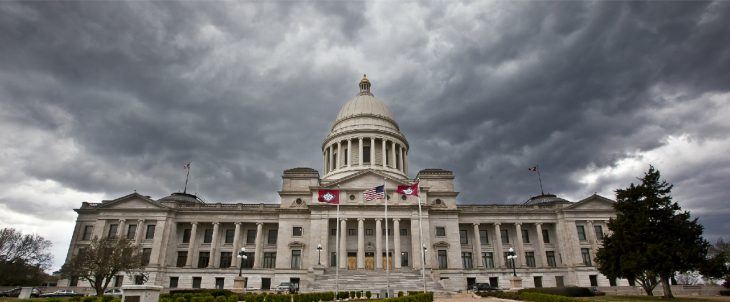Jonesboro senator concerned about state revenue trends; initially opposed guns on campus bill
by April 6, 2017 11:02 am 408 views

Sen. John Cooper, R-Jonesboro, expected state revenues to dip in March, and it will likely happen again in April, he told Talk Business & Politics. Arkansas’ March revenue report shows tax collections are well below expectations and year-ago levels with only three months left in the fiscal year.
March net general revenues came in at a dismal $345 million, $68.7 million or 16.6% short of a year ago and $50.2 million or 12.7% below forecast, according to the state Department of Finance and Administration’s revenue report released Tuesday (April 4).
“I’m not in a panic … it’s concerning,” Cooper during a speech at the Kiwanis Club of Jonesboro meeting. “It hasn’t been rosy the last several months.”
The year-to-date revenue picture was just as gloomy at $3.43 billion, $19 million or 0.6% above year ago levels. Now, nine months into the fiscal year, net available revenue is below forecast by $65.2 million or a decline of 1.7%. Last month, the state had a shortfall of only $15 million.
DFA Administrator for Economic Analysis and Tax Research John Shelnutt said April will be crucial in determining the state’s revenue picture for the end of fiscal 2017, which ends on June 30. Not only is April the tax filing deadline, but other revenue information will be gathered during the month, said the DFA economist.
“We have other things stacked up to happen this April that will be key for determining the course of the rest of the year,” Shelnutt told Talk Business & Politics.
GUNS ON CAMPUS
Cooper didn’t initially support the state’s newly adopted gun campus law when it was first proposed. The new law allows those with conceal carry permits to possess their weapons on state-funded universities and colleges as long as the person has taken an 8-hour enhanced safety course offered by the Arkansas State Police.
The initial bill allowed conceal carry in college sporting events. That portion of the law was amended after Southeastern Conference, SEC, and the Sunbelt Conference lodged complaints. Cooper blasted the National Rifle Association’s attempts to influence lawmakers into passing a more lenient bill, even after college administrators and law enforcement officials expressed concerns. He said he didn’t like the bill that was passed, but ultimately voted for it because he feared a much worse bill might be passed.
“I was not happy with what happened … the NRA and other interest groups don’t control my vote,” he said. “The Tea Party probably hates me. I’ve killed a bunch of their legislation. I’m not going to be jerked around by the NRA.”
The differences between the two legislative chambers are significant, Cooper said. He voted for internet sales tax collections, and it passed his chamber, but it failed in the House.
It’s an argument that began in the state during the 1940s when mail order catalogues began to take hold, he said. Proponents of internet sales tax collection argue those online companies have a competitive advantage over brick and mortar companies in the state. Opponents argue it would be just another tax on an already over-taxed population.
